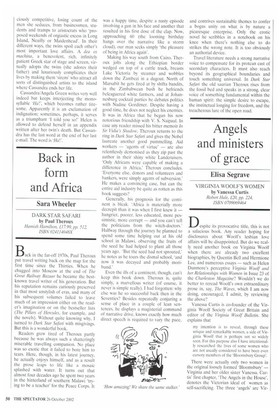Back in form and Africa
Sara Wheeler
DARK STAR SAFARI by Paul Theroux Hamish Hamilton, £17.99, pp. 512, ISBN 024114048X Back in the far-off 1970s, Paul Theroux put travel writing back on the map for the first time since the Thirties. When he chugged into Moscow at the end of The Great Railway Bazaar he became the bestknown travel writer of his generation. But his reputation remains curiously preserved in that most unstylish of eras, and many of his subsequent volumes failed to leave much of an impression either on the reader's imagination or on the bestseller lists (The Pillars of Hercules, for example, and the novels). Without quite knowing why, I turned to Dark Star Safari with misgivings. But this is a wonderful book.
Readers grew tired of Theroux partly because he was always such a shatteringly miserable travelling companion. No place was so exotic that it failed to bore him to tears. Here, though, in his latest journey, he actually enjoys himself, and as a result the prose leaps to life like a mosaic splashed with water. It turns out that almost four decades ago he spent two years in the hinterland of southern Malawi 'trying to be a teacher' for the Peace Corps. It was a happy time, despite a nasty episode involving a gun in his face and another that resulted in his first dose of the clap. Now, approaching 60 (the looming birthday hangs over the narrative like a storm cloud), our man seeks simply 'the pleasure of being in Africa again'.
Making his way south from Cairo, Theroux jolts along the Ethiopian border wedged on top of a cattle truck, breasts Lake Victoria by steamer and wobbles down the Zambezi in a dugout. North of Marsabit he gets fired at by shifta bandits, in the Zimbabwean bush he befriends beleaguered white farmers, and at Johannesburg cocktail parties he debates politics with Nadine Gordimer. Despite having a good time, he does not neglect his enemies. It was in Africa that he began his now notorious friendship with V. S. Naipaul. In case any reader missed his bitter memoir In Sir Vidia's Shadow, Theroux returns to the ring in Dark Star Safari and gives the Nobel laureate another good pummelling. Aid workers — 'agents of virtue' — are also relentlessly demonised as they zip past the author in their shiny white Landcruisers. 'Only Africans were capable of making a difference in Africa.' Theroux concludes. 'Everyone else, donors and volunteers and bankers, were simply agents of subversion.' He makes a convincing case, but can the entire aid industry be quite as rotten as this book suggests?
Generally, his prognosis for the continent is bleak. 'Africa is materially more decrepit than it was when I first knew it — hungrier, poorer, less educated, more pessimistic, more corrupt — and you can't tell the politicians from the witch-doctors.' Halfway through the journey he planned to spend some time helping out at his old school in Malawi, observing the fruits of the seed he had helped to plant all those years ago. 'But the seed had not sprouted,' he notes as he tours the dismal school, 'and now it was decayed and probably moribund.'
Even the ills of a continent, though, can't keep this book down. Theroux is, quite simply, a marvellous writer (of course, it never is simple really). I had forgotten: why else was he so successful back then in the Seventies? Besides repeatedly conjuring a sense of place in a couple of lean sentences, he displays a magisterial command of narrative drive, knows exactly how much direct speech is required to vary the pace, and contrives sustainable themes to confer a bogus unity on what is by nature a picaresque enterprise. Only the erotic novel he scribbles in a notebook on his knee when there's nothing else to do strikes the wrong note. It is too obviously an authorial device.
Travel literature needs a strong narrative voice to compensate for its protean cast of secondary characters. It must also reach beyond its geographical boundaries and touch something universal. In Dark Star Safari the old saurian Theroux rises from the fossil bed and speaks in a strong, clear voice of something fundamental within the human spirit: the simple desire to escape, the instinctual longing for freedom, and the treacherous lure of the open road.


















































































 Previous page
Previous page